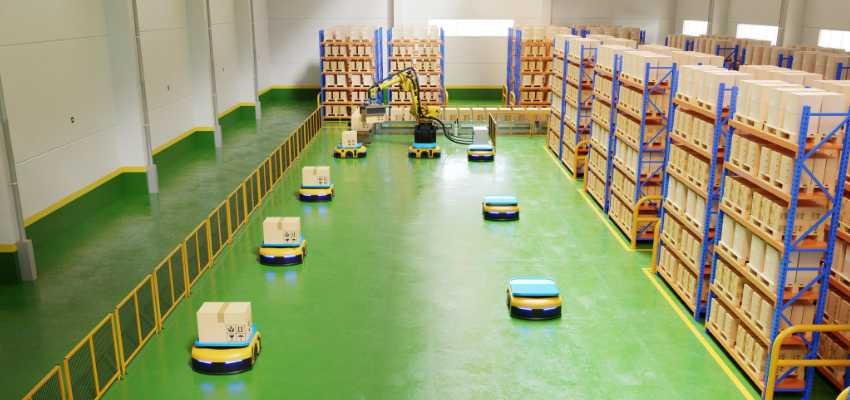Show:
Keep Up With Your Customer Demands By Increasing Your Inventory Control
It is more important than ever to keep up with customer demands in today’s business world. This can be done in several ways, but one of the most important is to have a sound inventory management system in place because it can help businesses avoid mistakes they commonly make when stocking inventory.

Importance of Inventory Control
Before understanding how inventory control helps businesses keep up with customer demands, it is essential first to understand what inventory control is, why it matters and what is the difference between inventory control and inventory management. Inventory control is “a system that monitors and regulates the ordering, storage, and use of materials and products in an organization.”
In other words, it helps businesses keep track of what they have in stock, where it is located, and how much of it is available. By having a sound inventory control system, businesses can avoid overstocking or understocking their products, leading to lost sales and unhappy customers.
This article will explore the different benefits of inventory control and how it can help businesses keep up with customer demands.
Improving Business Processes
A good inventory control system can help companies automate their inventory management processes.
Additionally, businesses can use inventory control systems to manage their internal processes better. By improving business processes, companies can run more efficiently and effectively.
Avoid Stock-Outs
A common issue that businesses face is stock-outs when customer demand exceeds the available inventory. These stock-outs can lead to lost sales and frustrated customers. A sound inventory control system can help avoid stock-outs by providing accurate information about inventory levels and customer demand.
Additionally, businesses can use inventory control systems to set reorder points, which can help ensure that there is always enough inventory on hand to meet customer demand.

Track Customers Preferences
Having a quality inventory control system can help businesses track customer preferences. Companies can use this information to ensure that the right products are in stock and make decisions about future product offerings. Additionally, monitoring customer preferences can help businesses customize their marketing efforts to meet their target market’s needs better.
Keep Up With Customer Orders
One of the most essential benefits of having a sound inventory control system is that it can help businesses keep up with customer orders. Tracking customer orders can help companies make sure that they can promptly meet customer demand.
In addition, it can help businesses identify trends in customer behavior, which can be used to make decisions about future product offerings and marketing strategies.
Reduce Overstock
Another common issue that businesses face is overstocking, leading to wasted inventory and lost profits. An inventory management system can help businesses reduce overstocking by providing accurate information about inventory levels and customer demand.
If a company is ordering more stock than necessary, it means that part of the capital is being invested in the wrong place. And it’s stuck until they’re able to sell the inventory.
An inventory control system will allow the company to know the right time to reorder a product.
Improve Customer Service
It is more important than ever to provide excellent customer service in today’s competitive business world. Businesses can improve their customer service by providing accurate information about inventory levels and customer demand. Having real information available at any moment can help ensure that customer orders are filled promptly.

Decrease Costs
Another essential benefit of having a sound inventory control system is that it can help businesses decrease costs. There are several ways that companies can use an inventory control system to reduce costs, including:
- Tracking inventory levels to help avoid overstocking
- Monitoring customer demand to help reduce stock-outs
- Using reorder points to help ensure that inventory levels are maintained at a reasonable level
- Reducing the need for manual inventory management
- Keeping track of lost or stolen items. An inventory control system discourages theft.
By decreasing costs, businesses can improve their bottom line and become more competitive in the marketplace.
Better Predict Customer Demand
An inventory control system can also help businesses better predict customer demand. Companies can use this information to make decisions about future product offerings and marketing strategies.
Additionally, tracking customer demand can help businesses identify trends in customer behavior, which will improve the accuracy of future predictions, thus providing even more benefits.
Reduce Employee Training Costs
Another benefit of having an inventory control system is that it can help businesses reduce employee training costs.
An inventory control system can provide employees with the information they need to do their job, reducing the need for training. Additionally, an inventory control system can automate many of the tasks associated with inventory management, further reducing the need for training.
Track Inventory Turnover
One of the most important metrics for businesses to track is inventory turnover. Inventory turnover measures how quickly inventory is moving through the company. A high inventory turnover rate is generally indicative of a healthy business, while a low inventory turnover rate can indicate problems.
An inventory control system can help companies track their inventory turnover rate and identify issues early.
Manage Supply Chains
Supply chain issues can significantly impact businesses, primarily if inventory levels are not managed properly. An inventory control system can help companies track their supply chains and ensure that inventory levels are maintained reasonably. Monitoring supply chains could entail keeping track of the following:
- Vendor information – This type of information can be used to track the progress of orders and ensure that inventory levels are maintained.
- Lead times – It’s essential to know how long it will take for inventory to arrive so that businesses can plan accordingly.
- Delivery schedules – This information can help companies ensure that they receive the merchandise they need when they need it.
Wrap Up
While inventory control isn’t the most exciting topic, it is vital to running a successful business. By increasing their inventory control, companies can keep up and predict customer demands, decrease costs, reduce employee training costs, track inventory turnover, and manage their supply chains.
An inventory management system will increase the profits of a business and make it gain market share.

 Return to Previous Page
Return to Previous Page








